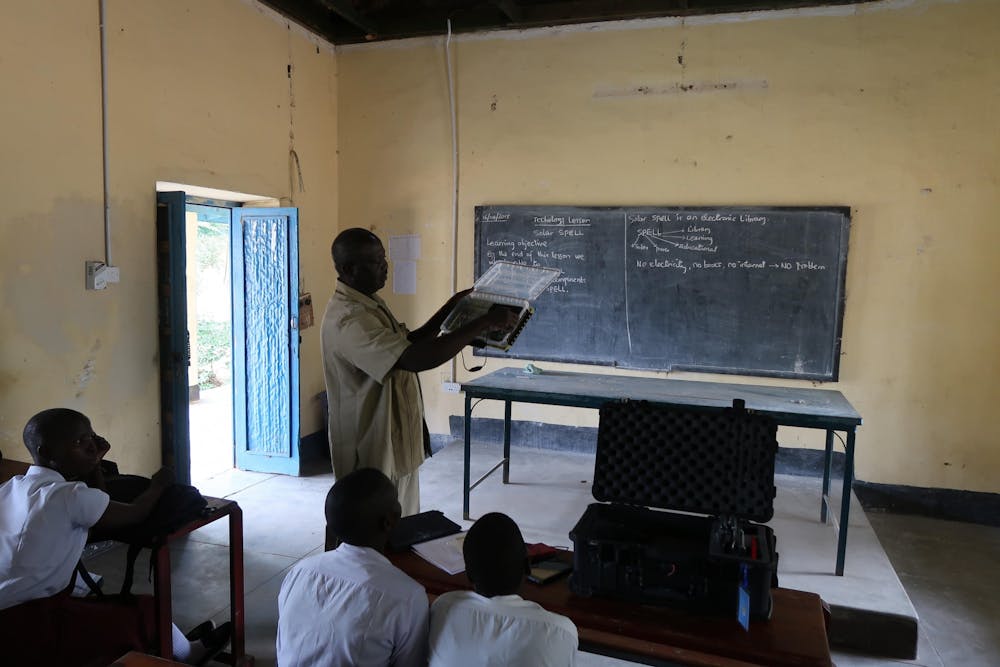ASU-housed SolarSPELL — Solar Powered Educational Learning Library — worked with Empower Kids South Sudan last year to distribute virtual textbooks and other learning materials around South Sudan following the shutdown of schools during the COVID-19 pandemic.
Due to the shutdowns, many students were left with little to no learning materials. Empower Kids South Sudan trained eight facilitators to bring SolarSPELL devices that store electronic learning materials around Juba, South Africa, so parents, teachers and students could access free digital resources. Meeting times and locations to access the devices were broadcast over the radio.
The SolarSPELL devices are digital libraries designed and produced by ASU students and professors. They require no access to internet or electricity. Each SolarSPELL device encases a solar panel, a battery, and a Raspberry Pi, which are low-cost, extremely compact computers. All the educational resources are curated and stored on microSD cards inside each device.
Each SolarSPELL unit broadcasts an offline Wi-Fi hotspot that allows users to access the digital library through common internet browsers like Google Chrome or Mozilla Firefox. The virtual interface for the library is designed to resemble the experience of using the internet.
Textbooks and other resources in the libraries come from a variety of sources. According to SolarSPELL co-founder and associate professor Laura Hosman, most of the content is "either Creative Commons or open access, or we ask for permission." New content is regularly obtained from Khan Academy, Wikipedia for Schools, and World's Largest Lesson.
"All the facilitators were provided with the medical protective materials such as sanitizers, gloves and facemasks to abide by the Ministry of Health’s protocols on COVID-19 preventive measures," wrote Hakim Monykuer Awuok, country director of Empower Kids South Sudan, in an email.
The project, named "Implementation of Distance Learning Program through Digital Library," ran from July to October 2020, according to Awuok.
In that time, Awuok said a total of 125,674 textbooks and other educational resources were downloaded from SolarSPELL digital libraries. 35,262 primary and secondary students and 54 primary and secondary schools downloaded or gained access to textbooks and other resources, he wrote.
According to UNICEF, all schools across South Sudan were closed in March 2020 and began reopening in October.
The partnership between SolarSPELL and Empower Kids South Sudan has been ongoing since January 2018. In July 2019, a team from SolarSPELL traveled to Juba, South Sudan, to launch the SolarSPELL Training Center at Juba Girls Secondary School.
SolarSPELL co-founders Hosman and adjunct faculty member Bruce Baikie from ASU's School for the Future of Innovation in Society's goal is to improve educational opportunities and internet-ready skills around the world.
Hosman said there are various ways for students to get involved with SolarSPELL. There is a project-based course offered to juniors and above in any major. SolarSPELL also takes on a few interns, volunteers, and research fellows every semester. Interns are recruited before the start of each semester.
According to Hosman, about 60 ASU students are involved in the SolarSPELL initiative every semester. "There are students involved in every single aspect of SolarSPELL," said Hosman. "That's absolutely by design."
Grace Umerani, a student from South Sudan currently attending the University of Rochester, interned with SolarSPELL last summer and helped curate content for the libraries.
"It's actually the best thing I've ever seen. Creating something in a box and (taking) it to a rural area which doesn't have internet, no electricity, nothing," Umerani said. "It still has the capacity to work perfectly to educate people. How cool is that?"
She said at her high school, textbooks were only given to instructors, and students would copy everything down from a blackboard. She said if you lose your notebook, "it's like the whole head is being cut off."
Umerani said she remembered students having to write and sit on the ground in grade school. She said students would go to school without any notebooks or pens and consequently had nothing to study outside of the classroom.
"I'm learning about these things and I know that people in South Sudan don't have these as skills," Umerani said of some of the curated content.
While digging through some of the medical content, she said, “this is going to save a lot of (lives) in South Sudan." She said she recommends the experience to other students.
"If I get a chance to work with SolarSPELL (again), I will be super happy,” Umerani said.
Reach the reporter at jageenen@asu.edu and follow @joshgeenen on Twitter.
Like The State Press on Facebook and follow @statepress on Twitter.
Continue supporting student journalism and donate to The State Press today.




